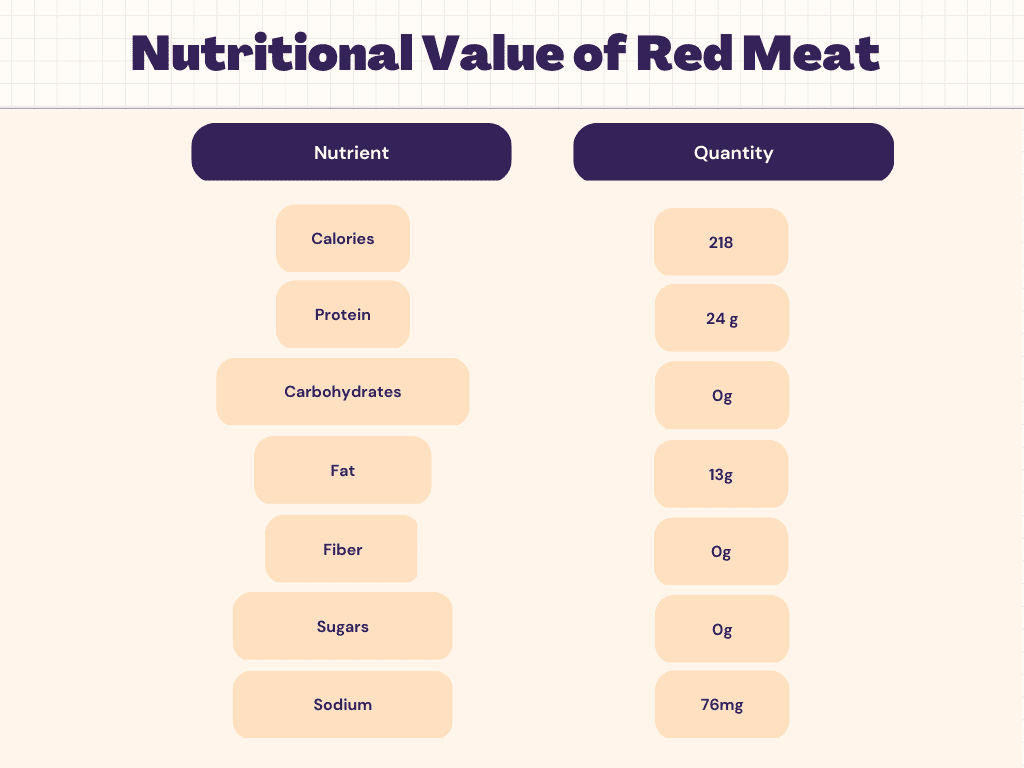Protein and important vitamins and minerals, such as iron, zinc, and vitamin B12, can be found in red meat. But, it also contains a lot of calories and saturated fat, which when ingested in excess, can lead to health issues.
Nutritional Value of Red Meat
Protein, iron, zinc, vitamin B12, and vitamin D are just a few of the many important nutrients that may be found in abundance in red meat. But, if taken in big quantities, it is also heavy in saturated fat and cholesterol, which can raise the risk of heart disease and other health issues.
The nutritional value of a 3-ounce (85-gram) serving of cooked ground beef is broken down as follows:
Nutritional Facts of Red Meat
Red meat is a good source of various key nutrients that are necessary for sustaining a healthy body. Here are some of red meat’s nutritional details:
Protein: Red meat is a great source of high-quality protein, which is necessary for maintaining muscle mass as well as for the growth and repair of tissues. Around 22 grams of protein are included in a 3-ounce (85-gram) portion of cooked beef.
Iron: Iron, a mineral that is essential for the body’s ability to transport oxygen, is another mineral that is abundant in red meat. Around 2.7 milligrams of iron are present in a 3-ounce portion of cooked beef, which is roughly 15% of the daily allowance for adult men and women.
Zinc: Red meat contains a lot of zinc, which is necessary for DNA synthesis, wound healing, and a strong immune system. The amount of zinc in a 3-ounce serving of cooked beef is about 4.2 milligrams or about 38% of the daily recommended value.
Health Benefits Of Red Meat
- Red meat is a great source of high-quality protein, which is necessary for repairing and constructing muscles. Also, it includes every necessary amino acid that the body needs for muscle building.
- Iron: One of the best dietary sources of iron is red meat. Iron is necessary for the creation of hemoglobin in red blood cells. Iron is necessary for hemoglobin, which transports oxygen from the lungs to other body areas. Red meat consumption that is sufficient in iron can help prevent anemia and weariness.
- Brain Function: Vitamin B12, which is essential for the health and function of the brain, is abundant in red meat. Getting enough vitamin B12 can help stop memory loss and cognitive deterioration.
- Energy: Iron and vitamin B12, both of which are crucial for energy metabolism, can be found in abundance in red meat. Red meat consumption can assist increase energy and reduce weariness.
- Aids Weight Loss: Red Meat has high protein content which aids weight loss, if taken in moderation. Check our weight loss plans.
Vitamins & Minerals in Red Meat
- Red meat is a great source of vitamin B12, which is needed for the development of red blood cells, healthy nerves, and proper brain and nerve function. Since that vitamin B12 is virtually solely present in animal products, red meat is a crucial dietary component for people who consume vegetarian or vegan diets.
- Red meat is a good source of vitamin B6, which is necessary for the immune system, the metabolism of amino acids, and brain and immune system function.
- Niacin, often known as vitamin B3, is found in red meat. In addition to supporting healthy skin, nerves, and digestion, niacin is crucial for energy metabolism.
- Phosphorus: Red meat is an excellent source of this mineral, which is necessary for healthy bones and teeth. The metabolism of energy and the preservation of healthy cells and tissues are both aided by phosphorus.
- Selenium: Red meat is a source of selenium, a mineral necessary for the development of antioxidant enzymes and immune system health.
The Bottom Line
Mammals including cows, pigs, sheep, and goats produce red meat, which is defined as their meat. Because of the high concentration of the protein myoglobin, which gives the meat its crimson hue, it is referred to as “red” meat. In many people’s diets, red meat serves as a significant source of protein, vitamins, and minerals and is a widely consumed food source worldwide.
Faqs
How much Red Meat can I eat in a day?
Your age, sex, level of activity, and any underlying medical concerns all have a role in how much red meat you can consume each day. Yet, due to its high amount of saturated fat and cholesterol as well as its link to a number of health hazards, dietary recommendations often advise reducing the consumption of red meat.
Should I eat Red Meat before or after exercise?
Red meat can be a rich source of protein, iron, and other nutrients that are necessary for muscle growth and repair, thus this is true. Hence, including red meat in your diet—either before or after—could boost your fitness objectives.
In order to allow for optimal digestion, it is advised to eat red meat at least 2-3 hours before exercising. A big meal eaten too soon before working out can give you indigestion, cramps, and pain. To provide you with energy for your workout, think about serving your red meat with carbohydrates like sweet potatoes or brown rice.
What is the best time to eat Red Meat?
It is advised to choose lean cuts of meat wherever feasible and to consume red meat in moderation as part of a balanced diet. Protein, iron, and other elements crucial for general health and well-being can be found in red meat. Yet, ingesting too much red meat—especially in processed forms—has been associated with some health hazards.










